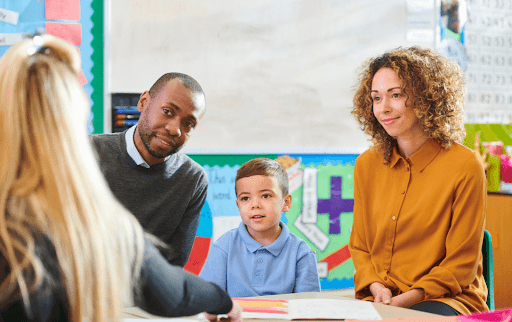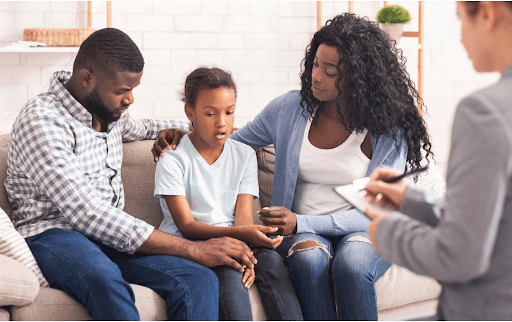Working in Partnership with Parents
Working in partnership with parents and carers is fundamental to providing high-quality early years education. Early years providers must ensure that parents and carers are fully engaged in their child’s learning and development and feel empowered to contribute to their child’s progress. This exercise requires building strong relationships based on trust, effective communication, and mutual respect.
The Early Years Foundation Stage (EYFS) in England provides guidelines and principles for working in partnership with parents and carers, which include involving parents and carers in planning and assessment, providing regular feedback and communication, and respecting the diversity of families and cultures. By adopting these best practices and strategies, early years providers can create a supportive and collaborative environment that benefits children, parents, and carers alike.

The Importance of Working in Partnership with Parents and Carers
 Working in partnership with parents and carers is paramount in providing high-quality early years education. According to research, involving parents and carers in their children’s learning is crucial in enabling some children to perform well, irrespective of their background.
Working in partnership with parents and carers is paramount in providing high-quality early years education. According to research, involving parents and carers in their children’s learning is crucial in enabling some children to perform well, irrespective of their background.
By working together, parents and carers can provide valuable insights into their child’s needs and interests, which can help early years providers tailor the curriculum to meet their child’s specific requirements. This can lead to more effective curriculum planning and delivery, ensuring each child has the best possible chance of success in school and later in life.
Involving parents and carers in their child’s learning can help establish a strong foundation for their education and future academic success. Therefore, early years providers should make it a key priority to work in partnership with parents and carers, as it is central to the Early Years Foundation Stage (EYFS)
Best Practices for Working in Partnership with Parents and Carers
When it comes to working in partnership with parents and carers, there are several best practices that early years providers should follow to ensure success.
One of the most important of these is effective communication. Early years providers should establish clear lines of communication with parents and carers, providing regular updates on the child’s progress and involving them in decision-making processes.
Communication can take many forms, including:
- face-to-face meetings,
- newsletters,
- emails,
- and text messages.
So, choosing the best method for each family is essential. Our organisation believes communication should be timely, concise, and transparent, ensuring parents and carers are always informed and up-to-date on their child’s learning and development. By following these best practices, early years providers can establish strong and positive partnerships with parents and carers, leading to better outcomes for the child.
Involving Parents and Carers in Learning
 Involving parents and carers in their child’s learning is essential to promote early learning. When parents and carers are actively involved in their child’s education, it can positively impact their development and well-being.
Involving parents and carers in their child’s learning is essential to promote early learning. When parents and carers are actively involved in their child’s education, it can positively impact their development and well-being.
Early years providers should provide parents and carers with regular opportunities to get involved in their child’s learning, such as volunteering in the classroom, attending parent-teacher meetings, and participating in workshops and training sessions. Our organisation believes that involving parents and carers in learning should be inclusive and accessible, taking into account any barriers to participation.
It’s essential to recognise that every family has unique needs and circumstances. Early years providers should work collaboratively with parents and carers to identify the best ways to involve them in their child’s learning. By working together, parents, carers, and early years providers can create a strong foundation for the child’s education and future success.
Building Trust and Respect
Building trust and respect is crucial for a successful partnership between early years providers and parents or carers. By establishing an open and transparent relationship with parents and carers, early years providers can create an environment that fosters trust and respect.
Early years providers should give parents and carers regular opportunities to give feedback and raise concerns. They should take the time to listen and respond to these concerns thoughtfully and constructively. Our organisation believes building trust and respect should be an ongoing process and that early year’s providers should work collaboratively with parents and carers to identify and address any issues.
When parents and carers feel valued and respected, they are more likely to be engaged and invested in their child’s learning, leading to better outcomes for the child. Research has shown that people at high-trust companies report higher engagement, satisfaction with their lives, and productivity than those at low-trust companies. By building trust and respect with parents and carers, early years providers can create a positive and supportive environment for the child and the family.
Providing Information and Support
Providing information and support is essential for parents and carers to engage in their child’s learning and development. Early years providers should provide parents and carers with clear and concise information on the curriculum, assessment, learning outcomes, and guidance on supporting their child’s learning at home.
Our organisation believes that information and support should be accessible and tailored to the needs of each family. It can include providing materials in different languages or formats, such as videos or visual aids, to ensure that all parents and carers can access the necessary information.
Early years providers should be available to answer questions and provide further support. By providing information and support, early years providers can help parents and carers feel more confident as their child’s first and most important educators.
It can lead to better outcomes for the child and a stronger parent-child relationship. Research has shown that babies with a strong attachment bond with their parents tend to have better emotional and social development later in life. By providing information and support, early years providers can help parents and carers create a solid and positive foundation for their child’s education and future success.
Celebrating Success
Celebrating success is essential to creating a positive and effective partnership between early years providers, parents, and carers. According to a Harvard Business Review article, celebrating small wins stimulates dopamine release in the brain. This feel-good chemical reinforces the learning experience and strengthens our sense of connection to those we work with.
Recognising and celebrating the achievements of children and families can help build a sense of pride and accomplishment, promote self-esteem, and motivate further learning and development.
Early years providers in the UK should provide regular opportunities for families to share and celebrate their successes. Somebody can achieve this through various ways, such as displaying artwork, sharing positive feedback, or hosting events to showcase children’s accomplishments.
Celebrating success should be inclusive and culturally sensitive, acknowledging the diverse backgrounds and experiences of the families served. Such celebrations can also promote a positive and supportive learning environment where children feel valued, respected, and encouraged to explore and learn.
Conclusion
I firmly believe parent and family engagement is critical to providing high-quality early years education. We recognise that practical partnership working can positively impact children’s development and well-being and the relationship between the early years’ provider and the family.
This approach is grounded in the belief that building strong and effective partnerships with families requires positive, ongoing, and goal-oriented relationships based on mutual respect and trust. By following the best practices and strategies outlined through this article, early years providers can develop long-lasting relationships with parents and carers to help children and families thrive. Working collaboratively with families is essential for providing the highest quality early years education, and we are committed to building strong, positive, and effective partnerships with parents and carers.
FREQUENTLY ASKED QUESTIONS
Q: What is the importance of partnering with parents in early years education?
A: Working in partnership with parents and carers is central to the Early Years Foundation Stage (EYFS) in the UK. Building strong relationships with parents can help create a positive and supportive learning environment for young children, as it allows practitioners to understand the child’s individual needs and strengths. It also supports parents’ involvement in their child’s learning and development, promoting consistency between home and educational settings.
Q: How can early years practitioners establish effective partnerships with parents?
A: Early years practitioners can establish effective partnerships with parents by creating a welcoming and supportive environment, regularly communicating with parents, and involving them in their child’s learning and development. It can be done through regular meetings, sharing information about children’s progress and achievements, and inviting parents to participate in events and activities. Being culturally sensitive and respecting different family backgrounds and experiences is also essential.
Q: How can partnerships with parents benefit children’s learning and development?
A: Partnerships with parents can benefit children’s learning and development by promoting consistency between home and educational settings and providing a supportive and positive learning environment. When parents are actively involved in their child’s education, it can help to promote better outcomes for children, such as improved social and emotional development, language and communication skills, and overall academic achievement. It can also help children to feel valued and respected, promoting positive self-esteem and a love for learning.
Q: How can practitioners involve parents in their child’s learning and development?
A: Practitioners can involve parents in their child’s learning and development by providing regular updates on children’s progress and achievements, inviting them to participate in events and activities in the setting, and sharing ideas for learning activities done at home. Practitioners can also ask for parents’ input and ideas and provide opportunities for them to volunteer in the setting or participate in decision-making processes.



